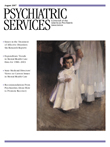As systems of care take up the challenge of transformation, various perspectives will arise on the desired outcomes of this process. Systems enter the process at different points, with different resources, and with different ideas of what they seek to achieve. This diversity can be useful, as homegrown strategies can be tested, successful approaches shared, and solutions tailored to ever-changing conditions.
I am concerned, however, that systems have already begun labeling as "recovery oriented" some services they have been providing for the past 30 years and have introduced as "transformative" new programs that leave much of the existing system intact. This concern is reinforced by the report in this issue by Rogers and colleagues, in which psychiatrists viewed the implications of recovery as limited to increased funding for rehabilitation, not appreciating how all mental health care, including their own practice, needs to be reoriented toward recovery. Such limited changes fall well short of the "fundamental refashioning" called for by the President's New Freedom Commission and risk repackaging old wine in new bottles. To avoid this temptation, perhaps we could achieve a consensus on the bare minimum we need to accomplish before transformation can be said to have occurred. I would like to propose one such minimum criterion.
The "promise" we have yet to achieve, to which the title of the New Freedom Commission report refers, was the promise first made a half century ago, that people with mental illnesses would be able to live "in the community in a normal manner." Given that the New Freedom Commission's vision is likewise "a life in the community for everyone," I propose that people do not have a life in the community as long as, and to the degree to which, they remain hospitalized. Having a life in the community should not equate with residing in an institution.
Hospitals serve an important function in recovery-oriented systems of care, offering acute care for acute episodes. Since the Olmstead decision, however, hospitals can no longer be considered acceptable places to live. Systems that invest scarce resources in training inpatient staff in person-centered planning, hoping to transform care by offering patients choices of meal times, neglect the fact that most people confined to hospitals would choose to live in the community. Such individuals, who still number in the tens of thousands, need safe, affordable housing options with responsive supports. Although transformation can involve more than this, it should not involve less. As the commission report makes clear, we now know how to afford people a life in the community. Achieving this promise is where and when true transformation will begin.

